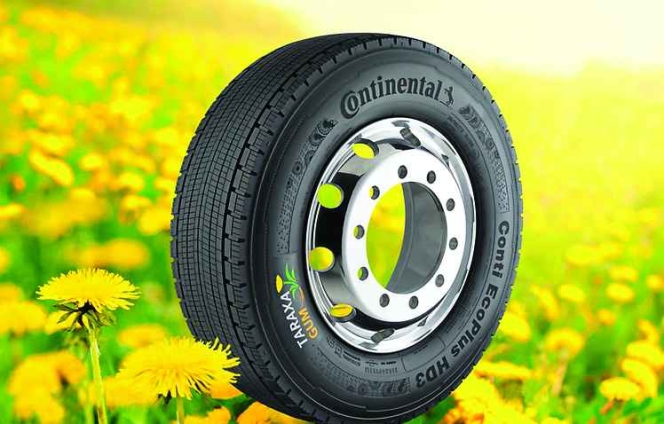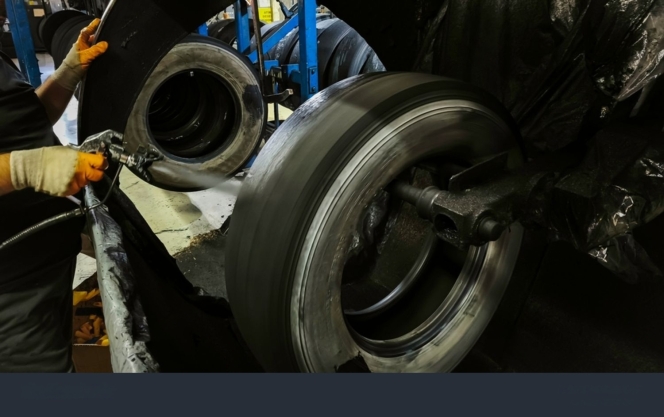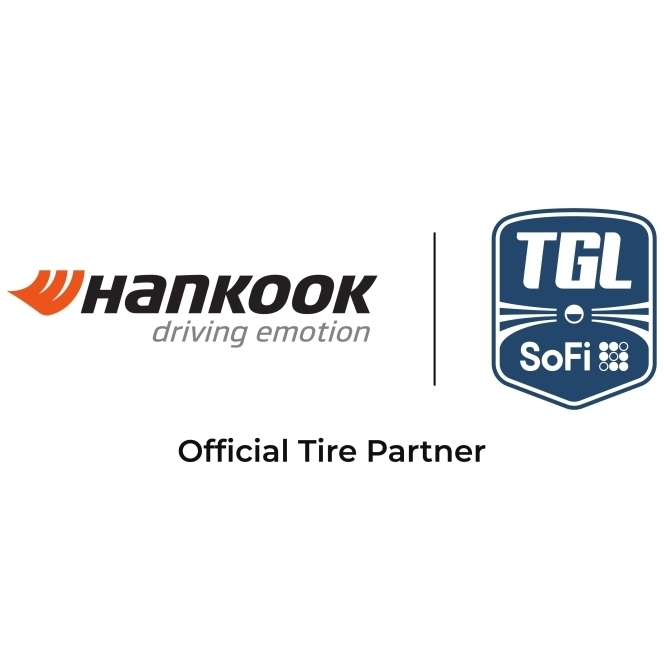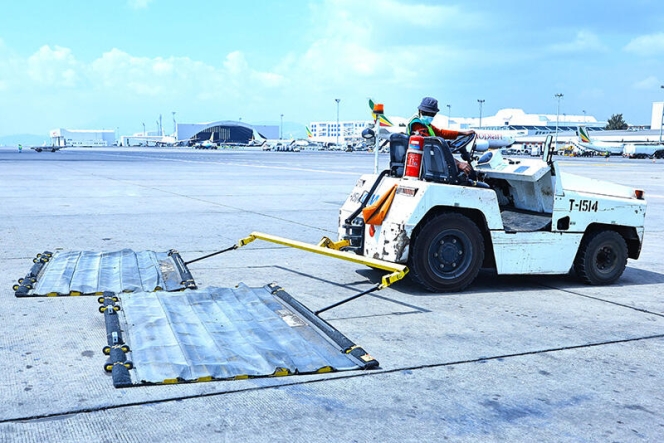Towards dandelion days
- By 0
- December 21, 2021

By Sharad Matade
As part of its sustainability efforts, Continental aims at using at least ten percent of natural rubber derived from Russian dandelion roots in its tyre and industrial rubber goods production in future.
“We have undertaken a huge research task to meet ten percent of our requirement of natural rubber from dandelion roots. It is a long-term process,” Dr Carla Recker, Head of Expertfield Materials Chemistry & Taraxagum, told Tyre Trends in an interview. “It will take decades to complement natural rubber from Hevea brasiliensis with natural rubber from dandelion plants at an industrialised level. However, the company does not intend to replace NR from Hevea brasiliensis trees.”
According to Dr Carsten Venz, Site Manager at Taraxagum Lab Anklam, “Dandelion will be an additional source of natural rubber, not a replacement to rubber trees, in the coming years.”

Continental has been consequent on the cultivation and processing of Russian dandelion as an alternative source of raw material to the rubber tree in the tropics. Last year, the company officially opened its research and test laboratory named Taraxagum Lab Anklam in Anklam, Germany, a base for its future research into the cultivation and processing of Russian dandelion, within a year after the ground-breaking ceremony held in November 2017.
“The Taraxagum Lab Anklam is the latest key milestone of our project,” said Dr Recker.
The Taraxagum project is crucial for the company. “The natural rubber from dandelion is important to develop a new alternative and sustainable supply of the raw material” Dr Venz said.
On bicycle tyres
Though the lab was opened last year, Continental started working on the dandelion rubber project in 2011, and the company has already used rubber from dandelion roots in its passenger car tyres, truck tyres and industrial rubber goods. “The latest development on production-side is that we have industrialised bicycle tyres with rubber derived from dandelions. So, you can now buy bicycle tyres of Continental made of dandelion rubber in the market,” Dr Recker said. Continental showcased its first bicycle tyre with dandelion rubber at the Tour de France this year.
Currently, the Taraxagum lab is working on dandelion research, and over the next five to ten years, it will focus on the industrialisation of dandelion rubber and increase the share for the dandelion rubber in its products.

“Continental sees the Russian dandelion as one element of our commitment for sustainable natural rubber as detailed in our Sustainable Natural Rubber Sourcing Policy published in October 2018. At least for us, the Russian dandelion is the most promising alternative source for natural rubber. There might be different sources (to get natural rubber), but that does not fit for us. The Russian dandelion can be grown in different climate zones unlike natural rubber from heave brasiliensis trees which need tropical climates to grow. Rubber trees and the Russian dandelion have the same characteristics, the same chemical structure and the same properties. It is just two plants producing the same material,” says Dr Recker. The advantage of dandelion rubber over rubber from trees is that the former has a generation succession of just three months as compared to seven years for the latter.
Since the dandelion plants can be cultivated in Northern and Western Europe, which makes transportation routes to the European production sites much shorter and contributes to the sustainable use of existing resources, thinks Continental.
However, the major challenge will be the 100 percent replacement of rubber made from trees with dandelion rubber. Dr Recker thinks, yes, technically, dandelion can replace tree rubber by 100 percent, but the more significant challenge will be the industrialisation of dandelion rubber to the level of rubber trees. “We are at a research stage. The amount of dandelion available globally is not enough to replace natural rubber commercially. To create that biological system to industrialise the natural rubber from the dandelion will take some time and we will have to be more patient,” says Dr Recker.
Research is a time and capital consuming task. Synthetic rubber is also coming into tyre production in a more significant way, but the crude oil derived commodity has historically been volatile, and even oil-producing nations are diversifying their businesses citing falling productions and growing focus on cleaner options.

Dandelion rubber is not new to the tyre industry; however, the industry does not seem much keen on dandelion plants as an alternative source for natural rubber. “Not everybody (tyre company) is willing to invest in the early research of dandelion rubber and setting up the entire bio-economy. You have to establish a full value chain from breeding to the production of natural rubber from dandelion plants, which is does not exist yet and not every market player is willing to invest in such a long-term process,” explains Dr Recker.
Since Continental sees dandelion a sustaining resource for natural rubber in the future, it has made a substantial investment for the project. It has already poured in 35 million euros for the project. “Though many of our peers are investing in other resources to get natural rubber, I think we are quite unique investing like the way we are to explore alternative resources for natural rubber,” says Dr Venz.
Over 90 percent of natural rubber derives from South East Asia, a tropical region suitable for natural rubber trees. However, erratic climate behaviour is hitting production of natural rubber in this region. Natural rubber producers are also exploring other areas to grow natural rubber trees. According to Dr Recker, the research project has yet to ascertain the survival scope of the Russian dandelion in changing climates. “I believe that Dandelion will grow in all climate zones,” says Dr Recker.
Yield ratio
As of now, Continental also does not have comparable yield ratios between natural rubber from dandelion and hevea brasiliensis. “We are working on determining the output of natural rubber per acre from both resources,” says Dr Venz. “Usually, between 1 and 1.8 ton per hectare per year is produced from rubber trees, and around the same amount of production per hectare we are expecting from dandelion plants,” estimates Dr Recker.
As part of the value chain creation, the company is focusing on breeding for seed production and harvesting, root production and harvesting, and the extraction process. According to the company, growers also need some time to understand and get hands-on to harvest dandelion plants. Every year climate conditions will determine a different impact on the plants. “We will need to see how the crops will react in different climate and harvesting seasons. We are building a network of farmers in North East Germany from whom we learn and whom we can teach what we have learned,” added Dr Recker.

Fundamental design and development of tires for the mobility of the future will be unchanged; however, tires will be expected to be high performance and eco-friendly. According to Continental executives, for the mobility of the future, natural rubber will remain the core ingredient and dandelion will be one of the sustainable options to provide natural rubber. “Rubber be will be used in future to make high-performance tires, and we are exploring the option to have a sustainable source for natural rubber,” adds Dr Recker.
- INDIAN TYRE INDUSTRY
- TYRE RETREADING
- BIS STANDARDS
- IS 15704
- ECE R109
- CIRCULAR ECONOMY
- MSME CHALLENGES
- AUTOMOTIVE REGULATION
- CARBON REDUCTION
- FREIGHT
- LOGISTICS
Retreading Hangs In Balance Over Regulatory Conundrum
- By Gaurav Nandi
- December 30, 2025

A population of over 1.4 billion people catapulting into the world’s third largest automobile market with four million trucks plying across a road network of 6.3 million kilometres supported by a USD 13.4 billion tyre market and a mining sector contributing around 2–2.5 percent of the country’s GDP demonstrate the strength of India’s automobile, freight and tyre sectors.
The story doesn’t end there as the Central Government adopts a strategic approach on reducing carbon emissions across these verticals, especially automobile and tyres, with targets such as the Net Zero Carbon Emissions by 2070, battery electric vehicles target by 2030, zero-emission truck corridors, Extended Producer Responsibility for the tyre sector; the list just goes on.
Amidst all such statistics and targets, a silent spectator remains the old and varied sector of tyre retreading. In a recent news story reported by Tyre Trends, the Indian Tyre Technical Advisory Committee (ITTAC) had made a proposal to Tyre Retreading Education Association (TREA) for mandating certain standards that will improve the quality of retreads. ITTAC has made recommendations to the BIS committee. TREA is part of the same committee. ITTAC and TREA are recommending different standards.
These standards included BIS retread standards, namely IS 15725, IS 15753, IS 15524 and IS 9168. The ITTAC had partially aligned Indian requirements with ECE R109, the European regulatory benchmark.
In a reply to the proposal, which was accessed by Tyre Trends, TREA urged the Indian Tyre Technical Advisory Committee to seek a deferment or non-applicability of BIS standard IS 15704:2018 for retreaded commercial vehicle tyres, warning that mandatory enforcement could cripple the sector.
In the letter, TREA argued that IS 15704:2018 is largely modelled on new tyre manufacturing norms and is technically unsuitable for retreading, which is a restoration and recycling process.
The standard mandates advanced laboratory tests such as spectrometer-based rubber analysis, endurance testing and compound uniformity checks, requirements that most retreading units, particularly small and medium enterprises, are not equipped to meet
The association highlighted that even large retreaders lack the infrastructure and skilled manpower needed for BIS-grade testing, while the sheer number of retreading units would make inspections and certifications operationally unmanageable for regulators.
TREA warned that compliance costs linked to machinery upgrades, audits and quality control could force 70–80 percent of units to shut down, leading to job losses, higher fleet operating costs and adverse environmental outcomes due to reduced recycling
Instead, TREA proposed that BIS prioritise retreading-specific standards such as IS 13531 and IS 15524, which focus on materials, process control, safety and quality consistency.
The body has also called for a phased transition roadmap, MSME support and industry training before any stricter norms are enforced, stressing that abrupt implementation would undermine the sector’s role in India’s circular economy.
The conundrum
India has a total of 36 administrative divisions comprising 28 states and 8 union territories. The tyre retreading sector has been continuously supporting circularity goals since the early 1970s across the world’s largest economy without getting mainstream recognition.
Even after five decades in service, the industry battles different bottlenecks including fragmentation, manpower shortage, tax pressures brought about by the recent GST revisions and now the implementation of such standards, just to name a few.
The sole practice that can simultaneously reduce carbon emissions from tyres and extend tyre life is assumed the nemesis of an ‘infamous and dangerous practice’ in some states of the country.
However, the industry has been drawing its techniques and quality parameters from the world’s oldest retreading economy, Europe.
“Big retreaders in India already have the necessary processes in place that conform to IS 15524 standards. However, as the standard is not yet mandated, we have voiced support for it because it is process-oriented and outlines how retreading should be carried out, including buffing and building procedures,” said TREA Chairman Karun Sanghi.
He added, “This standard focuses on how the work is done rather than imposing product-level testing that cannot be practically implemented. The current debate on IS 15704 stems from it being fundamentally incompatible. The standard includes requirements such as sidewall marking and destructive testing of retreaded tyres, which are impractical in a retreading environment where each tyre differs in brand, size, application and usage history,” he added.
Destructive testing, he argued, assumes uniform batch sizes. In retreading, where every casing is unique, testing even a single tyre would mean destroying finished products without yielding representative results. Applying such a framework would effectively require the destruction of every tyre in a batch, making compliance unviable.
“We have submitted our response to ITTAC and are awaiting feedback from the committee. We remain open to continued dialogue and will engage further once the committee responds to our submission,” said Sanghi.
According to him, a typical retreader processes about 300 tyres a month across multiple brands including MRF, JK Tyre, Apollo and Michelin and applications ranging from buses and trucks to mining vehicles. These casings vary widely in load cycles, operating conditions and duty patterns, often across several models from the same manufacturer.
The committee has cited European standard ECE R109, but Sanghi points to structural differences: “Europe is a global retreading hub where tyre manufacturers such as Michelin and Bridgestone dominate operations, collect their own tyres, retread them and return them to fleets, making batch-based destructive testing relevant. A similar model exists in US, where large tyre companies lead retreading and largely self-regulate without a single overarching standard. The Indian scenario is different, especially with a fragmented market.”
He stressed that the industry is not opposed to standards but to those that cannot be practically applied, warning that adopting European manufacturing-oriented norms without accounting for India’s market structure and operating realities would be counter-productive.
The debate is no longer about whether standards are needed but whether they are fit for purpose. Without accounting for India’s fragmented retreading ecosystem, enforcing impractical norms could dismantle a circular industry in the name of compliance.
TGL Season 2 Kicks Off With Hankook As Founding And Official Tire Partner
- By TT News
- December 29, 2025

The second season of TGL Presented by SoFi, where Hankook Tire serves as the Founding and Official Tire Partner, commenced on 28 December 2025. This innovative league, a venture of TMRW Sports with backing from icons like Tiger Woods and Rory McIlroy, represents a strategic alignment for Hankook, uniting two entities driven by technological advancement. The partnership provides a global platform to reinforce Hankook's premium brand positioning across North America and worldwide through extensive visibility during broadcasts and at the state-of-the-art SoFi Center in Florida.
This unique venue embodies the league's fusion of sport and technology, featuring a massive simulator with a dedicated ScreenZone and a dynamic GreenZone. This area, equipped with a turntable and over 600 actuators, meticulously replicates real-world golf conditions indoors, creating an immersive arena experience. The competition itself is fast-paced and engaging, with teams of PGA TOUR players competing in Triples and Singles sessions over 15 holes. Innovative elements like the point-doubling ‘Hammer’, real-time strategy via ‘Hot Mic’ and a Shot Clock ensure a dynamic spectacle for fans.
The season opener presented a compelling narrative as a rematch of the inaugural finals, pitting the undefeated Atlanta Drive GC, featuring Justin Thomas and Patrick Cantlay, against a determined New York Golf Club squad led by Matt Fitzpatrick and Xander Schauffele. This match set the tone for an intensive season running through March, where six teams and 24 top golfers will compete. For Hankook, this partnership is more than signage; it is an active engagement with a global community, delivering a distinctive brand experience that bridges cutting-edge mobility and sport for enthusiasts everywhere.
Dunlop Secures CDP ‘A List’ Recognition For Climate Change And Water Security
- By TT News
- December 29, 2025

Dunlop (company name: Sumitomo Rubber Industries, Ltd.) has made its way to the annual A-List of CDP for climate change and water security. This premier designation, awarded for the first time to the company in the 2025 evaluation, recognises world-leading performance in transparency, risk management and environmental action. CDP’s annual assessment is a key benchmark for corporate sustainability across climate, water and forests.
This achievement stems from the Group’s integrated approach to material issues outlined in its corporate philosophy. It treats the interconnected challenges of climate change, biodiversity and the circular economy holistically, advancing concrete initiatives under its long-term ‘Driving Our Future’ sustainability policy.
On climate, the Group’s science-based emission reduction targets for 2030 are validated by the Science Based Targets initiative. Operational efforts include pioneering green hydrogen production at its Shirakawa Factory and developing tyres made entirely from sustainable materials by 2050. The company also works to reduce emissions across its supply chain, lowers tyre rolling resistance to improve vehicle fuel economy and extends product life through retreading.
For water security, the strategy is driven by localised risk assessments at global production sites. In seven facilities identified as high-risk, the goal is to achieve 100 percent wastewater recycling by 2050. Progress is already evident, with the company’s Thailand factory reaching full wastewater recycling in 2024.
These coordinated actions on multiple environmental fronts formed the basis for the Group’s simultaneous top-tier recognition in both critical categories from CDP.
Bridgestone Launches Co-Creation Initiative With Ethiopian Airlines Group
- By TT News
- December 29, 2025

Bridgestone Corporation has initiated a novel co-creation programme in partnership with Ethiopian Airlines and Ethiopian Airports, focused on enhancing aviation safety at Addis Ababa Bole International Airport. This marks Bridgestone’s first sustained three-way collaboration with both an airline and an airport authority, targeting the reduction of Foreign Object Debris on runways and taxiways to support safer and more reliable aircraft operations.
The project was prompted by tyre-related incidents linked to debris at the airport, which previously risked disrupting flight schedules. Leveraging its specialised system for inspecting used airline tyres and analysing debris data, Bridgestone assessed conditions at the hub and proposed a tailored action plan. The company provided continuous support by analysing debris distribution patterns, developing visual hazard maps, advising on efficient collection methods and conducting training to raise awareness among airport personnel.
These sustained efforts have yielded significant results, substantially lowering the rate of tyre damage caused by runway debris compared to levels before the collaboration began. This reduction has supported improved on-time performance for Ethiopian Airlines while advancing overall operational safety. Additionally, the initiative has encouraged greater use of retreaded tyres, promoting economic efficiency and environmental sustainability within the airline’s operations.
Looking ahead, Bridgestone and Ethiopian Airlines Group plan to deepen their co-creation efforts, aiming to generate further value for the aviation sector and broader society through continued innovation and partnership.
Retta Melaku, Chief Operating Officer, Ethiopian Airlines, said, "At Ethiopian Airlines, the safety of our passengers, employees and aircraft is a priority. We are pleased to collaborate with Bridgestone to further strengthen our efforts in reducing FOD at Addis Ababa Bole International Airport and ensure safe operations at the hub airport."
Getaneh Adera, Managing Director, Ethiopian Airports, said, "We remain fully committed to upholding the highest safety standards at Bole International Airport at all times. This significant achievement in reducing FOD is the result of our strong commitment for safe operations and close collaboration with Bridgestone. Through our co-creation activities, we are pleased to have realised safer operations with enhanced productivity and economic value."
Jean-Philippe Minet, Managing Director, Bridgestone Aircraft Tire (Europe) S.A., said, "By combining the learnings and insights from Ethiopian Airlines' operational issues with our analysis technology and know-how, we have deepened our co-creation to propose customised solutions. We are delighted to contribute to safe aircraft operations with peace of mind and to improved operational productivity through the co-creation of efficient FOD reduction on airport surfaces. Through further expansion and evolution of this solution, we will amplify the value of our ‘Dan-Totsu Products’, trust with our customers and value of the data for creating new value."







Comments (0)
ADD COMMENT